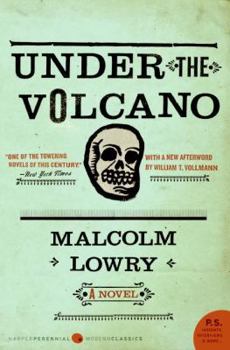Under the Volcano
Select Format
Select Condition 
Book Overview
Lowry's masterpiece. . . has a claim to being regarded as one of the ten most consequential works of fiction produced in the twentieth] century. -- Los Angeles Times Under the Volcano remains one of literature's most powerful and lyrical statements on the human condition, and a brilliant portrayal of one man's constant struggle against the elemental forces that threaten to destroy him. Geoffrey...
Format:Paperback
Language:English
ISBN:0061120154
ISBN13:9780061120152
Release Date:April 2007
Publisher:Harper Perennial
Length:448 Pages
Weight:1.01 lbs.
Dimensions:1.1" x 5.3" x 7.9"
Customer Reviews
4 ratings
Unquestionably a masterpiece.
Published by Thriftbooks.com User , 16 years ago
There can be no question that this book is a masterpiece. Most people don't like Wagner or his music, but regardless, The Ring Cycle is a masterpiece. "Not getting it" does not change the fact. The journey is the message; in art as in life. When you "see" - this book is an amazing journey. The writing is thrilling. It's the story of a complete life in the richest and most intricate sense. It's sad and telling that there only two reviews and one missed it.
"I love hell. I can't wait to get back there."
Published by Thriftbooks.com User , 18 years ago
Geoffrey Firmin, the former British consul to Mexico, is a prisoner of alcoholism. A victim of the shakes, he hears voices, talks to people who are not there, and hallucinates, though he is often able to hide the extent of his drinking. "True, he might lie down in the street, but he would never reel." On The Day of the Dead in 1938, his recently divorced wife Yvonne returns to Quauhnahuac, over which two smoking volcanoes loom, to try to persuade him to reconcile. Coincidentally, Geoffrey's half-brother Hugh, with whom Yvonne apparently had a brief affair, also arrives that day, and the three share quarters, each hoping to recapture the past. When they take the bus to Tomalin to a bull-riding event, they see a wounded peasant dying beside the road, the peasant's horse with the number 7 branded on its rump, a tricky pesado, and a group of vigilantes, all of whom play a role in the climax which follows. Rich with details, both of the external world of Quauhnahuac and the internal world of Geoffrey, the novel, first published in 1947, reflects Lowry's own experiences as an alcoholic. Geoffrey, a fully-rounded character, knows that he must stop drinking in order to function effectively, but he is unable to function at all without drinking. He both loves and despises Yvonne, wants to leave Mexico but wants to stay, and wants to find peace but creates chaos. As Lowry reconstructs this one day in Geoffrey's life, the Day of the Dead, the pervasive symbolism adds to the feeling of overpowering doom--the smoking volcanoes ready to erupt, the "hideous pariah dog" that follows Geoffrey and Yvonne to the house, a barranca (chasm) which exists beside the house and which contains a dead dog, an Indian carrying "the weight of the past," vultures in the forest, Yvonne's release of an eagle in a cage, and sudden storms. All add weight and intensity to this powerful story of dissolution. Despite the depressing subject matter and a frustrating main character who cannot or will not help himself during the novel's four hundred pages, the novel is breath-taking--elegant both in language and construction. Carefully plotted, filled with unique imagery, and enhanced by symbolism which brings it alive on new levels, it overwhelms the reader with its impact and approaches classical tragedy as the inevitable, doom-filled events play out. Though the novel includes peripheral political issues of the day--Mexico's instability and the philosophical conflicts between fascism and socialism--it is primarily a variation on the story of the Garden of Eden and the fall of man--full, rich, dense, and rewarding, despite its pervasive sadness. n Mary Whipple
The tragedy of a man in the 20th century
Published by Thriftbooks.com User , 23 years ago
Suddenly with a gun or slowly using other means, including alcohol, why does a man(I use the term generically) self-destruct?. Why was there virtually no suicides among occupants of Nazi concentration camps? Camus asserted there was only one important philosophical question and that was suicide. The protagonist in UNDER THE VOLCANO, Geoffrey Firmin ponders " Why am I here, says the silence, what have I done, echoes the emptiness, why have I ruined myself ....................." (p342) Suffused with superstition, mystery, bizarre activities set on the Day of the Dead in Mexico at the foot of a Volcano, with echoes of guitar music, and dead dogs, images reminiscent of an hallucinatory carnival from Alice in Wonderland, colour, horror, sounds, this is a novel rich in atmosphere. " A sound like windbells, a ghostly tintinnabulation reached their ears."(p324) "Three black vultures came tearing through the trees low over the roof with soft hoarse cries like the cries of love." p151 And telling and true insights like " It's amazing when you come to think of it how the spirit seems to blossom in the shadow of the ABBATTOIR".P91 A profoundly moving novel which must rank as one of the great novels of the 20th century so well is it crafted and so telling its story.
One of my favorite books of all time.
Published by Thriftbooks.com User , 25 years ago
Under the Volcano is an amazing novel of despair with some of the most stunning and evocative writing I had ever read. The novel charts a single day in the life of an alcoholic consul in Mexico who is beyond believing in the redemption of life, love or religion. The pace of the novel fits perfectly with its content, slowly tracing the unsteady steps of this incredibly insightful man. I was amazed by the beautiful writing and was transported by its vivid imagery. Stay with this book...it will stay with you.





